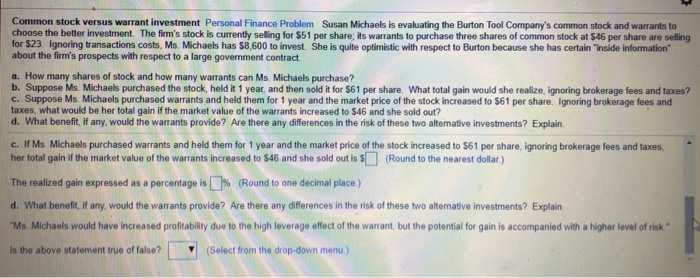Common stock versus warrant investment Personal Finance Problem Susan Michaels is evaluating the Burton Tool Company's common stock and warrants to choose the better investment. The firm's stock is currently selling for $51 per share, its warrants to purchase three shares of common stock at $46 per share are selling for $23. Ignoring transactions costs, Ms. Michaels has $8,600 to invest. She is quite optimistic with respect to Burton because she has certain "inside information about the firm's prospects with respect to a large government contract a. How many shares of stock and how many warrants can Ms. Michaels purchase? b. Suppose Ms. Michaels purchased the stock, held it 1 year, and then sold it for $61 per share. What total gain would she realize, ignoring brokerage fees and taxes? c. Suppose Ms. Michaels purchased warrants and held them for 1 year and the market price of the stock increased to $61 per share. Ignoring brokerage fees and taxes, what would be her total gain if the market value of the warrants increased to $46 and she sold out? d. What benefit, if any, would the warrants provide? Are there any differences in the risk of these two alternative investments? Explain. c. If Ms. Michaels purchased warrants and held them for 1 year and the market price of the stock increased to $61 per share, ignoring brokerage fees and taxes her total gain if the market value of the warrants increased to $46 and she sold out is (Round to the nearest dollar The realized gain expressed as a percentage is% (Round to one decimal place) d. What benefit, if any, would the warrants provide? Are there any differences in the risk of these two alternative investments? Explain Ms. Michaels would have increased profitability due to the high leverage effect of the warrant, but the potential for gain is accompanied with a higher level of risk Is the above statement true of false? (Select from the drop-down menu) Common stock versus warrant investment Personal Finance Problem Susan Michaels is evaluating the Burton Tool Company's common stock and warrants to choose the better investment. The firm's stock is currently selling for $51 per share, its warrants to purchase three shares of common stock at $46 per share are selling for $23. Ignoring transactions costs, Ms. Michaels has $8,600 to invest. She is quite optimistic with respect to Burton because she has certain "inside information about the firm's prospects with respect to a large government contract a. How many shares of stock and how many warrants can Ms. Michaels purchase? b. Suppose Ms. Michaels purchased the stock, held it 1 year, and then sold it for $61 per share. What total gain would she realize, ignoring brokerage fees and taxes? c. Suppose Ms. Michaels purchased warrants and held them for 1 year and the market price of the stock increased to $61 per share. Ignoring brokerage fees and taxes, what would be her total gain if the market value of the warrants increased to $46 and she sold out? d. What benefit, if any, would the warrants provide? Are there any differences in the risk of these two alternative investments? Explain. c. If Ms. Michaels purchased warrants and held them for 1 year and the market price of the stock increased to $61 per share, ignoring brokerage fees and taxes her total gain if the market value of the warrants increased to $46 and she sold out is (Round to the nearest dollar The realized gain expressed as a percentage is% (Round to one decimal place) d. What benefit, if any, would the warrants provide? Are there any differences in the risk of these two alternative investments? Explain Ms. Michaels would have increased profitability due to the high leverage effect of the warrant, but the potential for gain is accompanied with a higher level of risk Is the above statement true of false? (Select from the drop-down menu)







